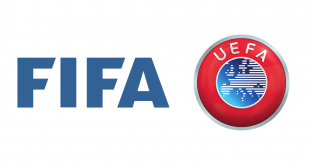 The world’s biggest conference for the business of soccer got underway at Manchester Central on Monday, September 26 with FIFA secretary general Fatma Samoura and Manchester mayoral candidate Andy Burnham to the fore.
The world’s biggest conference for the business of soccer got underway at Manchester Central on Monday, September 26 with FIFA secretary general Fatma Samoura and Manchester mayoral candidate Andy Burnham to the fore.
The 2016 edition of the Soccerex Global Convention was opened by the man many expect to become the first mayor of what he describes as “the global capital of football”. Labour’s Andy Burnham is a member of parliament for Leigh in Greater Manchester, and is also the shadow home secretary – responsibilities he will relinquish if he prevails next May in Manchester’s historic mayoral race.
Burnham is a Liverpudlian by birth, and made a series of jocular references to his links to that rival city. He is a fan of Everton: “The acceptable face, in Manchester, of Liverpool football.” He pledged a balanced outlook on football in the event that he does become Manchester’s mayor.
“I will be equally in favour,” he quipped, “of either Manchester United or Manchester City beating Liverpool.”
A little over a year ago, Burnham was taking what he hoped were his first steps on the road to becoming the British prime minister as the frontrunner in the race to lead the Labour Party. Events did not transpire as he, or almost anyone else, could have expected, with rank outsider Jeremy Corbyn prevailing and then leading the UK’s official opposition into open conflict with itself.
“The Labour Party conference right now makes a Fifa Congress look like a tea party,” Burnham said, speaking of the concurrently running event in Liverpool, “and I’ll be back there later with my tin hat.”
But Burnham (left) knows well the challenges that soccer faces at every level, at home and abroad. In 1998, with Labour in government, he was appointed to the Football Task Force, while in 2008 he served as the Secretary of State for Culture, Media and Sport. More recently, he has become a powerful advocate for the families of those 96 Liverpool fans killed in the Hillsborough disaster of 1989.
Safety at football grounds was transformed in the years after Hillsborough and Burnham said that next year’s 25th anniversary of the formation of the Premier League would give further pause for reflection on how the English game has changed since. Soccerex chairman Tony Martin had introduced Burnham with a speech that evoked an era of billion pound competitions, billion pound clubs, and now billion pound transfer windows, but one in which governance has also been “found wanting”. Burnham was to take the baton from there in a wide-ranging address which concerned itself, broadly, with issues affecting supporters everywhere.
He spoke approvingly of the successes of FC United of Manchester, a club founded by disgruntled former fans of Manchester United a decade ago and now boasting a robust following in the upper reaches of the semi-professional game. The top professional leagues, he said, cannot allow themselves to operate “in a bubble”. He was pleased that Premier league clubs had been convinced to continue selling TV rights collectively, and had pledged to hand over five per cent of that income to the grassroots game. There was, however, more that they could do.
A number of warning notes were sounded. Friday night football, he warned, might be a liberty too many taken with the loyalty of supporters. “Football isn’t all about television,” he said, stressing the difficulties fans might face in taking time off work to make cross-country trips with their teams.
Fundamentally, he stated: “This is the best game in the world.” But it is one he believes can be made better.
Whatever the audience, Burnham was intent on sharing “thoughts of mine to help stimulate your debate”, adding a reminder that the business of soccer was not about “cashing in” but about being “custodians of this game”.
“It’s about community,” he said. “It’s about people. That’s where football draws its great strength.”
Samoura’s tough task
Burnham had made mention of the convention’s keynote speaker in recounting a conversation with his daughters about his upcoming morning at the convention. The leading executive at soccer’s world governing body was female, he had told them. Her example could only inspire a new generation of young women.
Yet he also teed up Fifa secretary general Fatma Samoura’s appearance with a comment that spotlighted another apparent misstep in Zurich. On Sunday, Fifa confirmed it had chosen to disband its Taskforce Against Racism and Discrimination after declaring the body’s work complete. That, Burnham said, was a concerning decision with nationalism on the rise around the world.
“I worry about that decision with a World Cup looming in Russia,” he continued. “I don’t think we can be complacent and feel that we have succeeded in the fight against racism in sport.”
Samoura responded by attempting to clarify the terms on which the task force was dissolved, and insisted that it did not mean Fifa’s anti-racism work was anywhere near its end.
“The task force had a specific mandate which it has fulfilled and now we will turn its work into a programme – and a strong one – about zero tolerance against discrimination on the grounds of culture, races, colour of the skin and sexual orientation,” she said.
The decision has drawn stinging criticism from pressure group Kick It Out in the UK and former Fifa presidential candidate Prince Ali bin Al Hussein of Jordan, and the argument around it looks likely to rumble on in the weeks ahead. On stage, however, Samoura was at pains to draw a line under it, reiterating the comments from her speech in a later Q&A with Soccerex’s David Davies.
While that discussion will take most of the headlines, Samoura (right) had generally used her speech to introduce herself to the soccer industry.
“Being new to the administration side of football I am in the process of establishing relationships that will be important in how I carry out my responsibilities,” she said. “But I want to assure you as well that I am not new to the sport of football: it is a longstanding passion for me, and my family.
“My husband is a former player, and my brothers and uncles, too. My husband was the president of a local club in Senegal – and I worked with him, supporting the players as a friend and fan.”
Of perhaps greater interest, not least given the state of Fifa’s public image on her arrival, is Samoura’s background with the United Nations and her ability to rebuild trust in the sport’s administration. She spoke warmly, and sadly, of the power of soccer to unite, recalling stints in war-torn Sierra Leone and Liberia in the 1990s, in areas where “the only time people would stop the warfare was when it was raining – and when there was a football game”.
“The rest of the time,” she said, “they were fighting – including during Ramadan and Christmas.”
Samoura emphasised “a need for the game to better reflect the diversity of society, both on the pitch and in the way the game is run”, and cited her own appointment as testament to that. She also outlined some of the early reforms that had been implemented as a means of rebuilding trust and improving governance at Fifa, from the appointment of a chief compliance officer to the creation of a women’s football division.
Fifa, she insisted, “are a better association today than we were a year ago”, with further progress to come.
Davies challenged her on this point, asking whether the Fifa brand – for want of a better word – had been damaged beyond repair. She was adamant that it remained intact, and that there was an appetite for change.
She spent the rest of the day circulating the halls of Manchester Central, meeting and greeting selected exhibitors and delegates, before returning to the stage to present the inaugural Fifa Diversity Award to Slum Soccer, an organisation reaching out to some of the most disadvantaged communities in India through sport. Kick It Out was one of the other nominees, alongside the International Gay and Lesbian Football Association.
Samoura was asked again about the task force by the host of that award ceremony, CNN’s Amanda Davies. Again, the line was that the committee’s recommendations would be taken on board, and that Fifa’s struggle against discrimination could only continue.
It was a recurring exchange that perhaps exemplifies the task ahead of Samoura. Whatever the rights and wrongs of the task force policy, after the events of recent years, public faith in even the best-intended endeavours will be some time coming.
Premier League: ready for its close-up
Three of the world game’s more outward-facing domestic leagues were represented in a late-morning session on the main stage titled ‘International League Expansion’.
Kathy Carter (left) of Soccer United Marketing (SUM) was on hand to talk about the importance of rights distribution, not only domestically but internationally, in the growth of Major League Soccer (MLS).
Former Arsenal and Football Association (FA) vice chairman David Dein, by his own admission, is a Soccerex regular without compare. “Just as Arsene Wenger is celebrating his 20th year at Arsenal,” he said, “I’m enjoying my 21st successive year at Soccerex. Not quite the same notoriety, but there you are.”
He was in Manchester in his capacity as one of the early architects – and latter-day cheerleaders – of England’s recently rebranded Premier League, whose international profile is perhaps now unparalleled in any sport. That has long been evident in media rights sales and is now reflected digitally. Two thirds of interactions with the official Premier League website come from overseas, a figure that rises higher on social media: 97 per cent of official Facebook traffic is international.
Also in attendance was Adolfo Bara, director of sales and marketing at La Liga. Spain’s top flight has a strong claim to being the world’s strongest league on the pitch, having once again monopolised Europe’s elite trophies in 2015/16, but it is still chasing the Premier League when it comes to international popularity.
That pursuit is now being facilitated by a more coherent strategy, with collectivised TV rights sales giving clubs a shared goal and offices from
New York to New Delhi convincing local partners the league is there to stay: in an effort to stay closer to broadcasters, working together on content and sending ambassadors for interview; to make it easier coaches to local development programmes; and to create local sponsorship programmes which develop an in-market presence and help fund other activities.
Globally, the Premier League has set the pace and the panellists gave a few reasons as to the crux of its appeal. Dein cited its cosmopolitan nature, and its packed stadiums – with venues occupied to an average of 96 per cent capacity – of vociferous fans.
“TV companies love to see full stadiums,” he said.
Carter zeroed in on another aspect of international coverage of England’s top flight that makes it popular with broadcasters and audiences alike.
“From our perspective,” she said, “what the Premier League does very well, they produce the most gorgeous pictures you can see on television.”
She added: “With the exception of the National Football League, it’s probably the highest-quality production we see on US television.”
Social capital
When Gary Lineker presented Match of the Day in his underpants, making good on a bet about his beloved Leicester City winning the Premier League last season, it was one of the biggest moments for the BBC on social media so far. It was only outstripped – “if you’ll pardon the phrase” – by shares of last week’s footage of Olympic champion Alistair Brownlee dragging his exhausted younger brother and Rio 2016 silver medallist Jonny over the finishing line at the Triathlon World Series in Mexico.
The importance of ‘influencers’ like Lineker – the face of soccer for the BBC in the UK, but also a freelancer who fronts Uefa Champions League coverage for BT Sport – was something that BBC head of radio and digital Ben Gallop flagged up during a session in The Academy breakout room titled, ‘What can football learn from other sports that excel at social media?’ Intriguingly, Gallop also revealed how Britain’s public broadcaster is using social media to help further the activities of BBC Sport overseas.
Internationally, the BBC has the right to commercialise its output, something it has done to great effect through the distribution of original programming and the sale of concepts to the likes of The Great British Bake Off. When it comes to commercialising its sport, it has only “dipped [its] toe in the water”.
But working from the footprint that has long been established through the World Service, the BBC Sport social media project has a global outlook. It is offering clues as to which areas will be fruitful for future commercial projects: cricket, naturally, drives engagement in South Asia, while football coverage makes a huge impact for ‘Auntie’ throughout Africa.
Brexit means?
David Davies is the voice of Soccerex, and began the day speaking in tongues. He welcomed guests in English, French, Spanish – and Chinese, drawing some impressed mutterings from the assembled delegates in the main hall.
The audience at the Soccerex Global Convention is an international one and Davies decided early on in his opening address to reassure overseas guests that despite the UK’s narrow vote to leave the European Union earlier this year, the country was as open and welcoming as ever.
“Brexit means Brexit means Brexit,” he said, joking that no one really knows what that means.
The ramifications of the vote for soccer, and for sport, are even more difficult to comprehend at this stage and there were two conflicting viewpoints on stage.
Andy Burnham, who campaigned for the UK to remain in the EU but warned early and often that it would vote not to, suggested that English soccer could find an upside. The success of the national team, he said, still drove “pride” and “participation”, and outside of the union, clubs might now be able to guarantee opportunities for young English players.
“Could Brexit mean something different for football?” he asked. “Could Brexit mean that English football takes a step away from the European directives with relation to free movement in sport and could we look at introducing a quota for our home grown players? So that the Premier League doesn’t become a playground for the world’s best talent but, actually, we make sure that we bring through more English and homegrown players in our domestic league.
“I think that’s a debate that is worth having.”
David Dein, however, offered a very different perspective, arguing that the potential limits on freedom of movement that might result from Brexit would make life more difficult for those in the business of sport – among a host of other industries.
“I don’t think people voting for Brexit understood all of the implications,” said Dein, wearily.
He added: “I’m not sure that Brexit, particularly for sport, is going to be a good thing.”
Quote of the day
“The first team coach squeezes the lemon, the youth coach ripens it,” said by Red Bull head of global football Gerard Houllier, formerly head coach of Liverpool and France, gives a sharp take on player development.
 Arunava about Football A look at football & the world through my eyes!
Arunava about Football A look at football & the world through my eyes!



